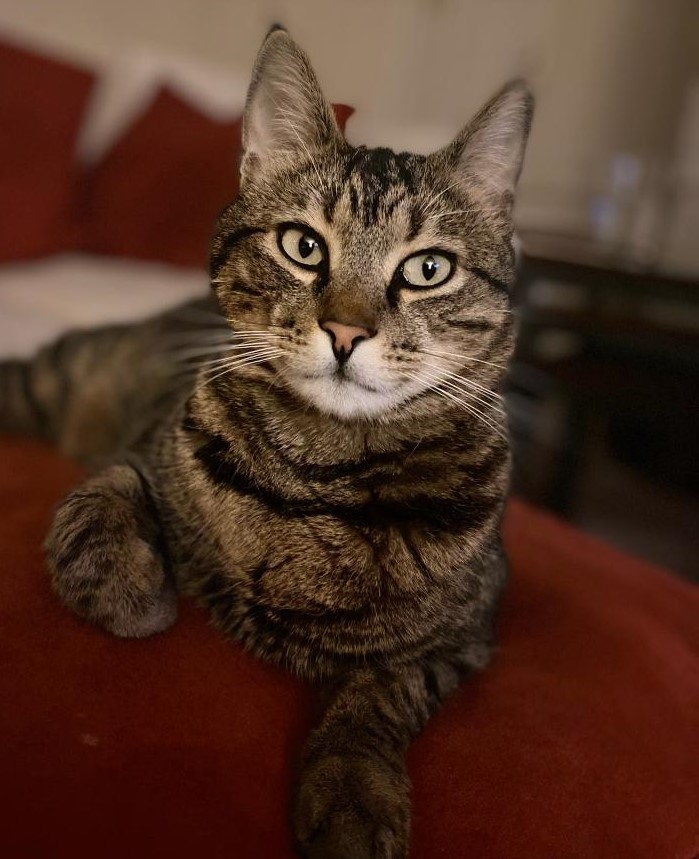Aegean cat
Aegean cat is a naturally occurring breed of domestic cat originating from the Aegean Sea region of Greece. Recognized for its remarkable sociability and friendliness towards humans, the Aegean cat is considered one of the oldest domesticated cat breeds in existence. This breed is particularly noted for its strong affinity for water, which is unusual among domestic cats. The Aegean cat's physical characteristics and its adaptability to its environment have made it a beloved pet among cat enthusiasts around the world.
Characteristics[edit | edit source]
Aegean cats are medium-sized with a muscular build, displaying a wide range of fur colors and patterns. Their coat, which is semi-long and dense, provides protection against the variable weather conditions of their native habitat. The most common color patterns include white with black or tabby patches, although they can come in a variety of other colors. Their eyes are typically clear and bright, with colors ranging from green to blue or even odd-eyed (having one eye of each color).
Temperament[edit | edit source]
Known for their friendly and affectionate nature, Aegean cats are excellent companions. They are highly social, both with humans and other animals, making them ideal pets for families. Their intelligence and playful demeanor often lead them to seek interaction, showing a keen interest in water-related activities, which is quite rare for cats. Aegean cats are also known for their hunting skills, a trait that has been preserved through their evolution in a predominantly island environment.
History[edit | edit source]
The Aegean cat has developed without significant human intervention, making it a genuinely natural breed. Originating from the islands of the Aegean Sea, these cats have been part of Greek life for centuries, often seen in coastal areas and living in close proximity to humans. Unlike many other cat breeds, the Aegean cat has not been the subject of deliberate breeding programs, which has helped maintain its robust health and adaptability.
Health[edit | edit source]
Aegean cats are generally healthy, with a long lifespan compared to other domestic cat breeds. Their natural selection process in the wild has contributed to a sturdy genetic makeup that is less prone to genetic disorders common in more heavily bred cats. However, as with all pets, regular veterinary check-ups are recommended to prevent common health issues and ensure they lead a healthy, active life.
Care[edit | edit source]
Caring for an Aegean cat involves regular grooming to maintain their semi-long coat, although their fur does not mat as easily as other long-haired breeds. They are active cats that require space to explore and play, making them more suited to environments where they can roam freely, ideally with access to outdoor areas. A balanced diet and regular exercise are essential to keep them in good health.
In Culture[edit | edit source]
The Aegean cat is deeply ingrained in Greek culture and is often associated with traditional Greek life. Their presence is ubiquitous in Greek mythology, literature, and art, symbolizing various attributes such as independence, intelligence, and beauty. Today, they continue to be a common sight in their native Greece, embodying the spirit and natural beauty of the Aegean region.
Search WikiMD
Ad.Tired of being Overweight? Try W8MD's physician weight loss program.
Semaglutide (Ozempic / Wegovy and Tirzepatide (Mounjaro / Zepbound) available.
Advertise on WikiMD
|
WikiMD's Wellness Encyclopedia |
| Let Food Be Thy Medicine Medicine Thy Food - Hippocrates |
Translate this page: - East Asian
中文,
日本,
한국어,
South Asian
हिन्दी,
தமிழ்,
తెలుగు,
Urdu,
ಕನ್ನಡ,
Southeast Asian
Indonesian,
Vietnamese,
Thai,
မြန်မာဘာသာ,
বাংলা
European
español,
Deutsch,
français,
Greek,
português do Brasil,
polski,
română,
русский,
Nederlands,
norsk,
svenska,
suomi,
Italian
Middle Eastern & African
عربى,
Turkish,
Persian,
Hebrew,
Afrikaans,
isiZulu,
Kiswahili,
Other
Bulgarian,
Hungarian,
Czech,
Swedish,
മലയാളം,
मराठी,
ਪੰਜਾਬੀ,
ગુજરાતી,
Portuguese,
Ukrainian
Medical Disclaimer: WikiMD is not a substitute for professional medical advice. The information on WikiMD is provided as an information resource only, may be incorrect, outdated or misleading, and is not to be used or relied on for any diagnostic or treatment purposes. Please consult your health care provider before making any healthcare decisions or for guidance about a specific medical condition. WikiMD expressly disclaims responsibility, and shall have no liability, for any damages, loss, injury, or liability whatsoever suffered as a result of your reliance on the information contained in this site. By visiting this site you agree to the foregoing terms and conditions, which may from time to time be changed or supplemented by WikiMD. If you do not agree to the foregoing terms and conditions, you should not enter or use this site. See full disclaimer.
Credits:Most images are courtesy of Wikimedia commons, and templates, categories Wikipedia, licensed under CC BY SA or similar.
Contributors: Prab R. Tumpati, MD

